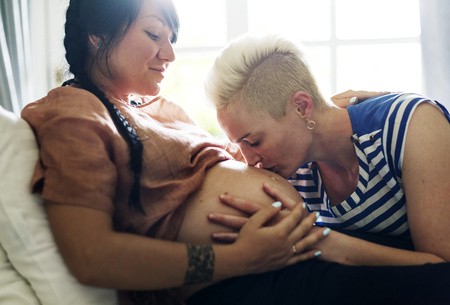A Survival Guide Featuring Whitney Barrell, LICSW

Coping with infertility can be one of the most challenging things that a couple experiences. It is hard on both people and the relationship. The CDC reports that millions of couples face infertility—6.7 million women in the US between the ages of 15 and 44 struggle with getting pregnant or carrying a baby to term.
The emotional (and physical) toll of infertility alone can be extremely taxing. Add to that the often high financial costs of in vitro fertilization, heightened sexual stress, and the silent shame of being unable to conceive, and you have a recipe for relationship chaos.
Yet, there is still hope.
A new study from Denmark suggests that most couples survive infertility challenges. The struggle to conceive (like other relationship struggles) presents an opportunity for couples to find strength in the midst of sorrow.
Can your relationship or marriage survive the stress of infertility? And what steps can (and should) you take with your partner to preserve your connection while going through such a stressful time? Better yet, how can you strengthen your bond after weathering the infertility storm together?
We reached out to Whitney Barrell, Clinical Director of the Utah Infertility Resource Center, to answer these questions and more. Here is what she had to say.
Be Aware of Depression & Isolation
Struggling with infertility causes a lot of internal stress, which can quickly turn into full-scale depression. For Barrell, this is because many individuals become “plagued by intrusive thoughts,” such as, “Will I ever be a parent?” or, “Am I the one to blame?”
Data from the Fertility Center of New England shows that one in six couples attempting pregnancy will have difficulty conceiving. Also, out of 15 million Americans experiencing infertility annually, men and women were shown to be affected equally.
“It becomes difficult to focus on other domains of life, such as work, school, and relationships,” says Barrell. “Isolation occurs, sometimes as a way to protect oneself. But this can often exacerbate symptoms of feeling alone, as though you are the only one dealing with infertility.”
Listen, Don’t Compare or Correct
 Partners can help prevent distance with one another by finding ways to support the other with their feelings and needs in the experience, understanding that each of you may have a different read on what is happening.
Partners can help prevent distance with one another by finding ways to support the other with their feelings and needs in the experience, understanding that each of you may have a different read on what is happening.
“Trying to support a loved one dealing with infertility can feel like walking on eggshells,” says Barrell. “You may not know what to do or what to say, and nothing seems to cheer them up.”
A good rule of thumb is to join with their experience — which may be the same as yours, or may be different. Make room for both of your perspectives. Instead of trying to talk them out of a feeling, offer a listening ear. Meanwhile, avoid giving suggestions such as, “Why don’t you see another doctor?” Or, “My cousin tried this herbal supplement, and now she’s pregnant.”
Explore your options together, and listen deeply to one another. This can be difficult at times, as the challenge of infertility can often weigh more on one partner than the other, especially when hormonal injections or other invasive procedures are involved. Also, if you or your partner are considering adoption while navigating infertility, it can make the process even more frustrating and (at times) even heartbreaking.
However, chances are you know more intimately what is going on for your partner than those removed from the situation. Know that suggestions can, at best, be patronizing. At worst, they are akin to pouring salt on an open wound. What your loved one will benefit from most is having someone on their side who will listen, encourage, and support them.
Trade Shame for Strength
Not only can infertility cause intense emotional stress, but it also can cause feelings of shame. It is a double-edged sword: On one hand, the situation is entirely outside of your control. On the other, it is inextricably linked to your physical being and to decisions that can sometimes feel “right” or “wrong.” The shame that results can be hard to avoid. And this is true whether or not you are the childbearing partner.
“Because infertility involves words such as ‘semen analysis’ or ‘intrauterine insemination,’ many feel ashamed even to share their experiences with loved ones,” says Barrell. “Men diagnosed with male-factor infertility may be sinking under the cultural ethos that their worth is connected to their semen analysis.”
Shame happens in isolation, and we know that infertility is often a quiet journey that couples bear without a community to support them. Addressing the issue and even seeking counseling is an antidote to feeling alone and ashamed. Both men and women may fear judgment, or feel that they should be able to handle these complex emotions on their own. The result creates a Catch 22, in which a reluctance to talk about the issue can perpetuate the shame.
Couples therapy can help shine a light on the issue. By bringing your infertility “into the open air,” you can significantly reduce any sense of stigma and move forward in finding real emotional solutions to the problem.
Remember, You Are “In It” Together

“Just as each person brings their own past experiences and worldview to infertility, their experiences of it differ as well,” says Barrell.
“In some relationships, women [who want to carry children] feel that their non-childbearing partners aren’t ‘as upset about infertility’ as they are. Conversely, those same non-childbearing partners report feeling a pressure to ‘hold everything together’ because they are witnessing their partner in such distress.”
Couples also often face an imbalance in their physical experiences. In fact, research suggests that the emotional experience of women facing infertility is comparable to the emotional pain felt by women facing cancer, HIV, and chronic pain. Also, according to the National Infertility Association, most women need multiple rounds of IVF before it is successful.
The childbearing partner might undergo significantly more intrusive testing, injections, monitoring, and possible surgeries than the non-childbearing partner, which can create a rift, leaving one partner feeling as though they are bearing the entire load. Meanwhile, the non-childbearing partner can be under considerable stress on how to support their partner through infertility.
In these moments, it is crucial to acknowledge the experiences of your partner and find ways into emotional connection despite your different perspectives. Also, try scheduling “non-infertility dates,” during which neither of you talks about children, medical treatments, or your desires to grow a family. Focus instead on one another and the ways you like to connect. Invite a little spontaneity back into your love life (and your bedroom, if possible).
When In Doubt, Seek Help
There are ways to protect your relationship from the potentially damaging stress of infertility. Seeking outside support can be invaluable to restoring the bond you once had with your partner.
When the infertility issue becomes the “only issue” discussed in your relationship, reaching out to a licensed couples therapist might be the way to go. At NCCT, we offer couples therapy, using three leading evidence-informed methodologies for couples on the brink, including Gottman Method and Emotionally Focused Therapy.
For those with limited schedules, we also offer couples retreats, couples therapy weekends and online couples therapy.
